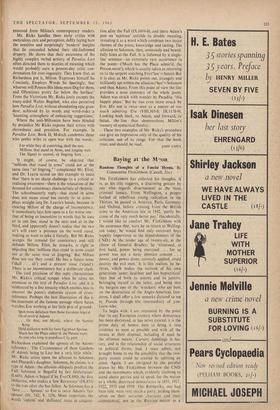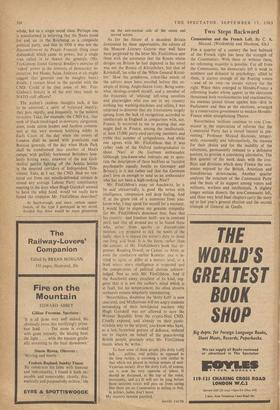Baying at the Mon
Random- Thoughts • of a Fastist 'Hyena. ' By Constantine.FitzGibbon. (Cassell, 21s.) MR. FrtzGinnoN has' collected his thoughts. It is, as his title suggests, a disarming gesture by one who regards disarmament as the "most criminal lunacy. From Wellington, a proper hotbed of rebellious -young radicalism in the Thirties, he passed. to America, Paris, Germany and Oxford, . before crossing froni the, British army to the American late in 1942, 'partly be- cause of the very much better pay.' (Incidentally, I would like to comfort' Mr. FitzGibbon with the assurance that, were he to return to Welling- ton today, he would find only extrovert boys happily impervious to the blandishments of the CND.) At the tender age of twenty-six, at the elbow. of General Bradley, he 'witnessed, at first hand, power being exercised . . . for us power was not a nasty abstract concept . . . power, and power alone, correctly applied, could destroy the evil men.' It is this realism, he be- lieves, which makes the outlook of his own generation 'saner, healthier and less hypocritical' than that of both its seniors and its juniors. Belonging myself to the latter, and being into the bargain one of the 'wreckers' who are bent , on the destruction of the Anglo-American free- doms, I shall offer a few remarks dictated to me by. Pravda through tthe intermediary of you-
k nOw-who. •
To begin with, I am interested by the point that 'in any European country where democracy ,has been destroyed, or has never existed, it is the prime duty of honest men to bring it into existence as soon as possible and with all the means at their disposal, including if need be the ultimate means.' .Cursory dabblings in his- tory, and in the relationship of social structures to political forms, had, 1 must . admit, not brought home to me the possibility that the two- party system could be created by splitting an atom. Again, I am intrigued by the parallel drawn by Mr. FitzGibbon between • the CND and the movements which, evidently claiming to stand above parties and to speak for the nation as a whole, destroyed democracies in 1851, 1917, 1922, 1933 and 1958. The Bolsheviks, one had been told, were very much a party, priding them- selves on their sectarian character and their commitment, not to the ,Russian nation as a whole, but to a single social class. Perhaps one is misinformed in believing that the Nazis stood for and sat in the Reichstag as a composite political party, and that in 1958 it was not the Rassemblement du Peuple Francais (long since disbanded) which came to power, but a single man called in to thwart the generals. (Mr. FitzGibbon found General Bradley's exercise of 'naked' power in the interests of democracy in- structive; but Massu, Salan, Jouhaux et cie might suggest that generals can be naughty boys.) Really, I remain blind to the parallel with the CND. Could it be that some of Mr. Fitz- Gibbon's history is of the sort they teach to NATO staff officers?
The author's random thoughts lack, it has to be admitted, a spirit of balanced inquiry; they pass rapidly, and frequently, to the noisiest invective. Take, for example, the CND (i.e., that mob of black-stockinged sit-downers, clergymen, dons, trade union leaders and faceless commis- sars at this very moment babbling wildly in Earls Court of the day when the streets of London shall be paved with prostitutes and Russian generals, of the day when Hyde Park shall be transformed into another of Mao's camps, with gullibly horizontal Britishers love- lessly kissing away, unaware of the last Gait- skellite patriot fighting off the Asiatic hordes in the deserted corridors of Independent Tele- vision). Take, as I say, the CND. Had we ven- tured out from our missile-defended retreats to attend any average Labour Party constituency meeting in the days when Hugh Gaitskell seemed to have the whip hand, would we really have found the creatures Mr. FitzGibbon describes?
At Scarborough, and since, certain oppor- tunists, of the type I portrayed in my novel, decided that there would be more promotion on the anti-nuclear side of the ocean and moved across.
As for the future of a decadent Britain dominated by these opportunists, the editors of the Moscow Literary Gazette may well have been perplexed by the letter Mr. FitzGibbon sent
them with the assurance that the Russia whose designs on Britain he had depicted in his novel was not the Russia of Khrushchev, but that of Kornoloff, 'an echo of the White General Korni- boy.' How the ponderous, robot-like minds of the editors must have recoiled before this ex- ample of biting, Anglo-Saxon irony. Being some- what ideology-soaked myself, and a member of the fraternity of `whining' left-wing novelists and playwrights who can see in my country nothing but washing-machines and tellies, I was surprised to discover that my frustrations largely sprang from the lack of recognition accorded to intellectuals in England in comparison with, say, France. It occurred to me in passing that one might find in France, among the intellectuals, at least 15,000 party-card-carrying members and treble that number of sympathisers. And while one agrees with Mr. FitzGibbon • that it was rather rude of the Oxford undergraduates to shout 'Nazi' at the German ambassador (although you-know-who instructs me to ques- tion the description of these hecklers as 'racialist psychopaths equally hostile to Germany and Britain'), is it not rather sad that the Germans don't love us enough to send us an ambassador who has not been a high-ranking Nazi?
Mr. FitzGibbon's essay on Auschwitz, let it be said unreservedly, is good. He writes with intelligence, compassion and deep feeling. And if, at the grave risk of a summons from you- know-who, I may speak for myself for a moment, I would like to expreSs my genuine sympathy for Mr. FitzGibbon's dominant fear. Sure that his country—and freedom itself—are in constant peril, and that all around are to be found those who, either from apathy or discreditable motives, are prepared to lick the boots of the bully, then it is indeed the writer's duty to shout out long and loud. It is the form, rather than the content, of Mr. FitzGibbon's book that de- presses. Reading Orwell, or Camus. or Aron, or even the combative earlier Koestler, one is in- vited to agree or differ at a mature level, at a level where one's intelligence is respected and the complexities of political choices acknow- ledged. Not so with Mr. FitzGibbon. And if the Auschwitz essay, excellent of its kind, sug- gests that it is not the author's mind which is at fault, but his temperament, his often abusive outbujsts remain singularly unendearing.
Nevertheless, doubtless the 'dotty Left' is now castrated, and Michaelmas will see angry students demanding of their bewildered teachers why Hugh Gaitskell was not allowed to save the Weimar Republic from the crypto-Nazi CND. Cruelly exposed, and already on their 'Arlie- stricken way to the airport, you-know-who have, as a last, hysterical gesture of defiance, ordered me to inquire on behalf of the peace-loving British people, precisely what Mr. FitzGibbon means when he writes:
To hear some of these people [the dotty Left] talk '. . . politics, real politics as opposed to the limp variety, is assuming a role similar to that which sex played in certain sectors of mid- Victorian society. (For the dotty Left, of course, sex is now the very opposite of taboo. It should be discussed, at the top of the voice, incessantly, and is.) It will not be long before those insistent voices will pass on from saying that there are no Communists to telling.us that, in politics, ladies don't move.
My masters remain puzzled.
DAVID CAUTE































 Previous page
Previous page